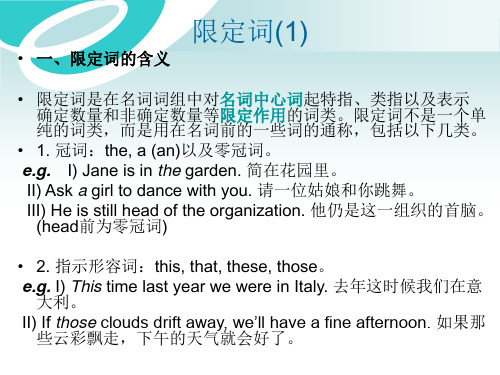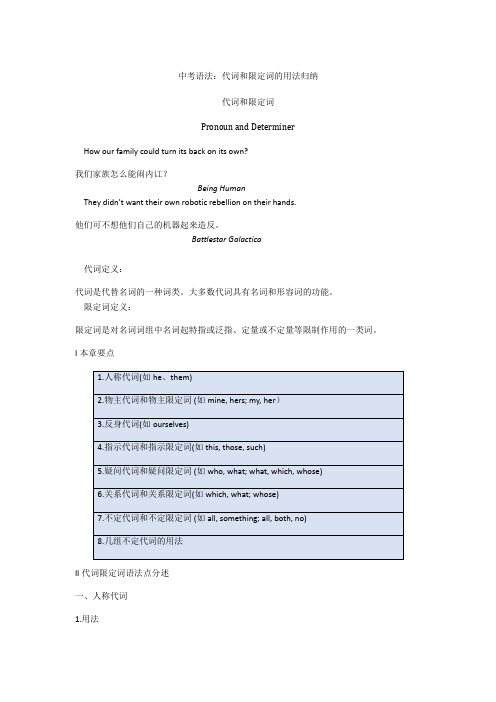限定词的用法
- 格式:docx
- 大小:2.14 MB
- 文档页数:2

限定词单数复数的用法
限定词是一种用于具体化或限定名词范围的词语。
在使用限定词时,需要根据名词的单数或复数形式来选择适当的限定词。
以下是一些常见的限定词的用法:
1. 单数名词:当名词是单数形式时,我们可以使用以下限定词来修饰单数名词:
- a(an): 用于描述泛指的事物,表示“一”或“一个”。
例如:I have a car.(我有一辆车。
)
- the: 用于描述特指的事物,表示“这个”或“那个”。
例如:The dog is barking.(那条狗在叫。
)
2. 复数名词:当名词是复数形式时,我们可以使用以下限定词来修饰复数名词:
- some: 用于描述泛指的事物,表示“一些”。
例如:There are some books on the table.(桌子上有一些书。
)
- the: 用于描述特指的事物,表示“这些”或“那些”。
例如:The cats are playing in the garden.(那些猫在花园里玩耍。
)
需要注意的是,有些名词没有复数形式,或者有些名词的复数形式和单数形式相同,这时候我们仍然需要根据具体的语境来选择适当的限定词。



限定词限定词(DETERMINER〕是在名词词组中对名词中心词起特指(SPECIFIC REFERENCE〕、类指(GENERIC REF ERENCE〕以及表示确定数量(DEFINITE QUANTITY〕和非确定数量(INDEFINITE QUANTITY〕等限定作用的词类。
名词词组除有词汇意义外,还有其所指意义(REFERENTIAL MEANING〕,是特指(即指特写的对象〕,还是类指(即泛指一类人或物〕;是有确定的数量,还是没有确定的数量。
能在名词词组中表示这种所指意义的词类就是限定词。
英语的限定词包括:定冠词(DEFINTITE ARTICLE〕,不定冠词(INDEFINITE ARTICLE〕,零冠词(ZERO ARTICLE〕物主限定词(POSSESSIVE DETERMINER〕,my, your, his, her, our, your, their, one’s, its.名词属格(GENITIVE NOUN〕,John’s, my friend’s.指示限定词(DEMONSTRATIVE DETERMINER〕,this, that, these, those, such.关系限定词(RELATIVE DETERRMINER〕,whose, which.疑问限定词(INTERROGATIVE DETERMINER〕,what, which, whose.不定限定词(INDEFINITE DETERMINER〕,no, some, any, each, every, enough, either, neither, all, both, h alf, several, many, much, (a) few, (a) little, other, another.基数词(CARDINAL NUMERAL〕和序数词(ORDINAL NUMERAL〕倍数词(MULTIPLICATIVE NUMERAL〕和分数词(FRACTIONAL NUMERAL〕量词(QUANTIFIER〕a lot of, lots of, plenty of, a great of, a good deal of, a large of, a small amount of, a quantity of, a great of, a good number of等。

中考语法:代词和限定词的用法归纳代词和限定词Pronoun and DeterminerHow our family could turn its back on its own?我们家族怎么能闹内讧?Being HumanThey didn’t want their own robotic rebellion on their hands.他们可不想他们自己的机器起来造反。
Battlestar Galactica代词定义:代词是代替名词的一种词类。
大多数代词具有名词和形容词的功能。
限定词定义:限定词是对名词词组中名词起特指或泛指、定量或不定量等限制作用的一类词。
I本章要点II代词限定词语法点分述一、人称代词1.用法a.性的一致单数第三人称代词有阳性、阴性和中性之分,它们的使用决定于所指对象的自然性别。
b.关于it★小试身手★1)Do you see that good-looking young man? _____ is Professor Du, who comes from the star.2)A teacher should offer_____ students challenging projects.3)I love China very much. _____ is very beautiful.4)I have a pet dog. _____ follows me wherever I go.5)Who is it? –It’s (I/_____).6)_____ illegal to drive without a license.7)_____ no use arguing with him.二、物主代词和物主限定词★小试身手★1)My husband’s father is a doctor. ______(My/Mine) is a lawyer.2)I plan to enter for a summer camp with a friend of ______. (me)三、反身代词1.形式2.用法★小试身手★填空并判断以下句中反身代词的成分:1)The queen ______attended the meeting.2)I cut ______shaving this morning.3)I could hardly believe she had made a video about water pollution by ______. (her)4)Frank is not quite ______today. (upset or ill)5)Just between ______, he is a selfish man.6)Those who smoke heavily should remind ______ of health, the bad smell and the feelings of other people.A. theirsB. themC. themselvesD. oneself3.中考常考固定搭配连线:1)help oneself to……别客气!2)enjoy oneself 过得愉快,玩得高兴3)(all) by oneself 随便取,随便吃,随便喝4)say to oneself 自言自语5)teach oneself = learn by oneself 自首6)make yourself at home. 单独地,独自地7)play with oneself 自娱自乐8)turn oneself in 自学9)find oneself 找到自我四、指示代词和指示限定词 1.指近还是指远1)These are new books. (These/Those) are old ones. 2)Life is not easy in the US (these/those) days. 3)Life was not easy in the US (these/those) days.2.指人还是指物指示代词通常指物,但在介绍人或电话交谈时,可以指人。

限定词语法要点(Main points)1) Determiners are used at the beginning of noun groups.限定词用于名词短语前面。
2)You use specific determiners when people know exactly which things or people you are talking about.当所涉及之人物或事物确定,使用特定限定词。
3)You use general determiners to talk about people or things without saying exactly who or what they are.当所涉及人物或事物不确定,使用不定限定词。
语法透析1) When you use a determiner, you put it at the beginning of a noun group, in front of numbers or adjectives.限定词用于名词短语前面,置于数字或形容词之前。
例如:1) I met the two Swedish girls in London. 我在伦敦碰见那两个瑞典女孩。
2) Several young boys were waiting. 好几个小男孩在等待。
2) When the people or things that you are talking about have already been mentioned, or the people you are talkingto know exactly which ones you mean, you use a specific determiner.当所涉及之人物或事物确定或是在前文已被提及,使用特定限定词。
例如:1) Young people don’t like these operas. 年轻人不喜欢这些戏剧。
限定词(Determiners)(一)概述:限定词是对名词词组中心词起特指或泛指、定量或不定量等限定作用的一类词。
限定词包括冠词、不定代词、指示代词、名词或代词所有格、数词与某些形容词性的物主代词。
(二)限定词包括哪些:①冠词:a, an, the②形容词性物主代词:my, your, her, his, our, their, one’s, its③指示代词:this, that, these, those④不定代词:all, both, one, any, some, no, another, either, neither, and est.⑤形容词:every, each, such, next, last, other, and est.⑥副词:twice, three, times, double, and est.⑦数词:one, two, three, first, second, one-third, and est.⑧名词的S所有格:Mary’s, China’s, teacher’s, and est.⑨量词短语:a lot of, a bit of, a number of, a great deal of, plenty of, and est.例如:The building has an emergency exit on every floor.冠词的用法:(1)定冠词(the)的用法:a. 用于单数名词前,代表某一类人或物。
例如:--This is easier for the teacher than for the student.--The whale is in danger of becoming extinct.--The compass was invented in ancient China.b. 用于指世上独一无二的东西,如The sun, the moon, the earth, the sky, the universe, the outer space, the world, the globe, the atmosphere等。
定词是与名词密切相关的词类,包括冠词( a ( n ),the )、形容词性指示代词( this ,that, these,those )、形容词性物主代词 ( my,your ,our,etc .)、形容词性不定代词( both,every ,much,some, etc .)、数词( one,two ,etc ;first ,second,etc .;one-third,three-fifths ,etc .) 和特指形容词 ( next,only,etc .)。
限定词用于名词的前面,限定名词所指的范围,表示该名词是特指还是泛指,是定量还是不定量。
限定词的使用并非随意,受着名词种类及形式的制约,与名词有着特定的搭配关系,在多个限定词连用时相互之间还有着相对固定的位置限定词一般不用于专有名词,用于普通名词时要根据名词的数和类别来决定。
普通名词可分为如下三类:单数可数名词,如: a desk, a pencil 等。
复数可数名词,如: desks, pencils 等。
不可数名词,如: coffee, fire 等。
各限定词与三类名词搭配关系可分为以下几种情况:A. 能与三类名词搭配的限定词定冠词 the, 如:the book, the books, the bread 等。
物主代词、名词所有格,如: my /John's book my /John's books my /John's breadall / some / any / no ,如: all / some / any / no book all / some / any / no booksall / some / any / no breadother / such ,如: other / such student other / such studentswh -words (eg. what, which, whose 等)。
限定词(determiner)限定词是在名词词组中对名词中心词起特指、泛指、定量或不定量等限定作用的一类词。
一、英语限定词种类1.定冠词,不定冠词,零冠词。
如:the, a2.名词属格。
如:my friend’s, Tom’s…3.物主限定词。
如: my, your …4.指示限定词。
如:this, that, these, those, such…5.疑问限定词。
如:what, whose, which…6.关系限定词。
如:which, whose…7.不定限定词。
如:some, any, each, every, either, neither, all8.数词(基数词、序数词、倍数词、分数词)9.量词。
如:a lot of, lots of , a great/good deal of ,a great/large/good number of …二、限定词与三类名词的搭配关系限定词按它词汇意义可分为特指限定词、泛指限定词、定量限定词、不定量限定词四大类。
这四类限定词有的能与单数、复数可数名词搭配,也可与不可数名词搭配1) 能与三类名词搭配的限定词主要有the; my, John’s, the old man’s…; some, any, no, all, other,such, what(ever), which (ever), whose…eg. the book----the books----the money,my book----my books----my moneyJohn’s book--- John’s books---- John’s money2) 能与单数名词搭配的限定词。
如:a (n) , each, every, another, either ,one, neither, many a, such a (n) …eg. each worker,every student,either book,another book3) 能与复数名词搭配的限定词。
考研英语语法特殊限定词的用法详解附译文►表示“多”的限定词表示“多”的限定词有many, much, a lot of, lots of, plenty of等。
1)many, much常用于否定句和疑问句,而a lot of等则常用于肯定句。
I haven't seen many English novels.Have you drunk much water today?I have seen a lot of / lots of / plenty of / a great number of English novels.I have drunk a lot of / lots of / plenty of / a great amount of water today.2)many / much 既可作限定词,也可作不定代词,a lot 也可单独用作名词词组:Have you seen all these novels? ----No, I haven't done very many.You have done a lot for me.►表示“少”的限定词表示“少”的限定词有(a) few, (a) little。
1)a few, a little表示"少量",带有肯定意义。
Let's invite a few friends to our party.I had a little difficulty in reading this poem.2)few / little表示否定意义,相当于not many / much, not enough。
I have very few pens left. Could you give me some more.There is little food in the fridge. Let’s go to the supermarket.3)quite a few, a good few, not a few表示“相当多”。
外教一对一
限定词的用法
限定词是在名词短语中对名词中心词起特指、泛指、定量或不定量等限定作用的一类词。
限定词总是位于名词中心词之前。
当与作前置修饰语的形容词同时修饰一个名词中心词时,要位于形容词之前。
一、限定词的形式
限定词有以下形式:冠词(如: a, an, the, 零冠词)、物主限定词(如:my, their, its, his, her, our, your)、名词所有格(如:John’s, my friend’s等)、指示限定词(如:this, that, these, those, such)、关系限定词(如:whose, which, whichever, whoever 等)、疑问限定词(如:what, which, whichever等)、连接限定词(如:what, whatever, whose, whosever等)、不定限定词(如:no, some, all, another等)、数词(如:one, second, third等)、表示倍数和分数的词(如:double, twice, one-third等)、开放性量词(如:a lot of, plenty of等)。
二、限定词与三类名词的搭配关系
限定词的选择取决于其后的名词是单数名词、复数名词,还是不可数名词。
1. 能与三类名词搭配的限定词有the,any,some,no,what,which,whose,数词,物主限定词以及名词所有格。
2. 只能与单数可数名词搭配的限定词有each, a(n),every,another,either,neither,one,such a(n),many a(n)等。
3. 只能与复数可数名词搭配的限定词有these, those, several,both,(a) few, many, a great number of, three等。
4. 只能与不可数名词搭配的限定词有much, (a) little, a great / good deal of, a great amount of等。
5. 只能与复数可数名词及不可数名词搭配,不能与单数可数名词搭配的限定词有more, most, enough, other, a lot of, plenty of 等。
外教一对一
三、限定词与限定词的搭配关系
一个名词前如果有两个或两个以上的限定词,那么这些限定词按先后顺序可分为前位、中位、后位限定词。
如:
all the four teachers (前+中+后)
both the twin brothers (前+中)
those last few months (中+后+后)
1. 前位限定词有all, both, half, double, twice, one-third, what等。
2. 中位限定词有a(n), the, this, that, these, those, my, your, his, her, its, some, no, every, either, enough, what (ever) 等。
3. 后位限定词有 one, first, another, many, (a) few, a lot of, such等。